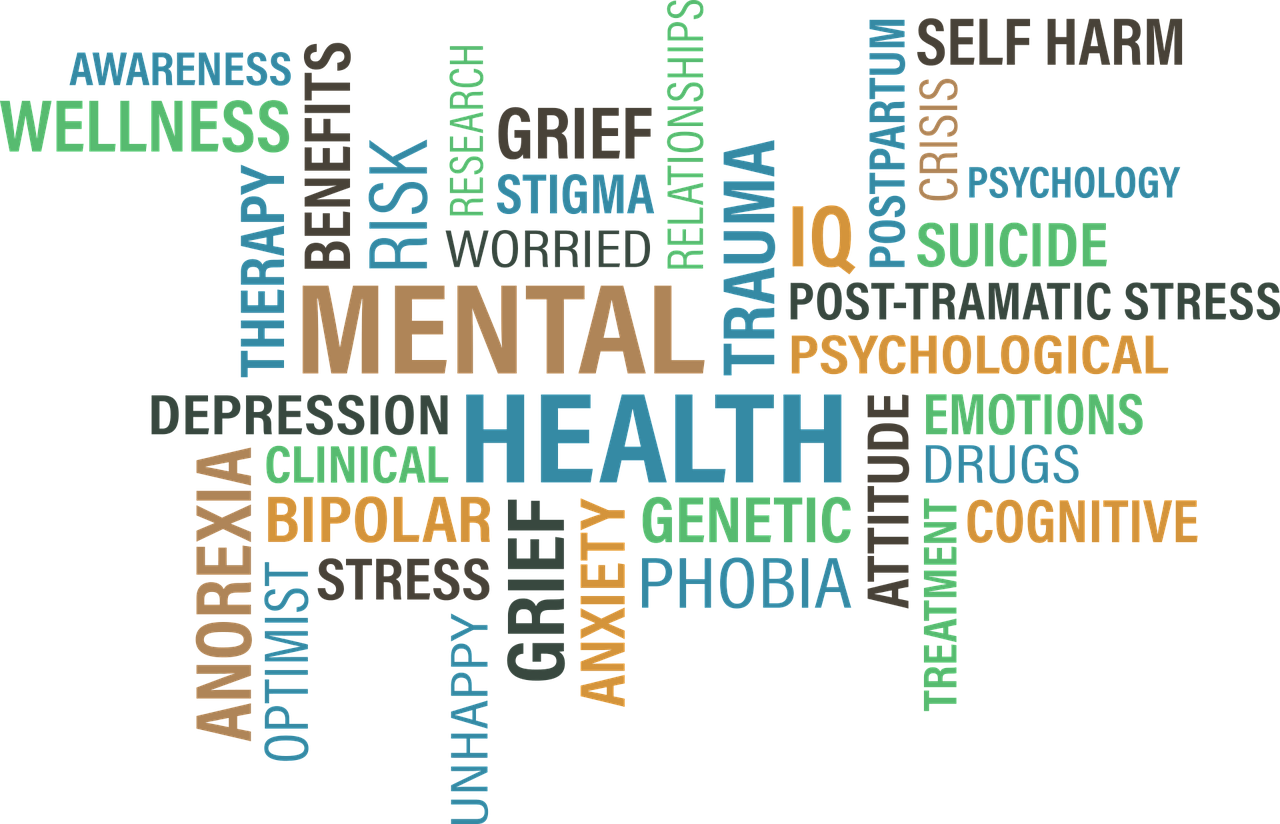Mental health awareness is the understanding, recognition, and acceptance of mental health as an integral component of overall well-being. It encompasses knowledge about mental health conditions, their prevalence, symptoms, and available treatments, as well as efforts to reduce stigma and promote access to resources and support for individuals experiencing mental health challenges.
Mental health awareness in Nigeria is an important but often overlooked issue. While progress has been made in recent years, there are still significant challenges that need to be addressed in the area of stigma and cultural believe, awareness and education, limited access to mental health services, inadequate Funding and Infrastructure, impact of Socioeconomic Factors
STIGMA AND CULTURAL BELIEVE

Stigma and cultural beliefs surrounding mental health in Nigeria play a significant role in shaping attitudes and behaviors towards individuals with mental illnesses. Here are some key aspects of stigma and cultural beliefs:
- Spiritual Attribution: In many Nigerian communities, mental illness is often attributed to spiritual or supernatural causes rather than recognized as a medical condition. It is common for people to believe that mental health problems are the result of curses, witchcraft, or demonic possession. This spiritual attribution can lead to stigma, discrimination, and social ostracism of individuals with mental illnesses and their families.
- Fear and Misunderstanding: Stigma surrounding mental health issues is fueled by fear, misunderstanding, and misinformation. Many people have limited knowledge about mental illnesses and may hold negative stereotypes and beliefs about individuals with psychiatric disorders. This lack of understanding contributes to feelings of shame, secrecy, and isolation among those affected by mental health conditions.
- Social Exclusion: Individuals with mental illnesses and their families often face social exclusion and discrimination within their communities. They may be subjected to ridicule, gossip, and social rejection, leading to feelings of loneliness, shame, and low self-esteem. Stigma can also impact individuals’ ability to access employment, education, and healthcare services, further exacerbating social and economic inequalities.
- Religious and Cultural Practices: Religious and cultural beliefs influence attitudes towards mental health and shape help-seeking behaviors. While religion can provide comfort and support for individuals facing mental health challenges, it can also perpetuate stigma and discourage individuals from seeking professional help. Traditional healers and spiritual leaders may be consulted for treatment, leading to delays in accessing evidence-based care.
- Gender and Stigma: Gender norms and expectations also play a role in shaping stigma surrounding mental health. Women, in particular, may face greater stigma and discrimination due to cultural beliefs about gender roles, emotional expression, and caregiving responsibilities. Gender-based violence, such as domestic abuse or sexual violence, can further exacerbate mental health issues and stigma for women.
- Challenges in Disclosure: Due to stigma and cultural beliefs, many individuals and families may hesitate to disclose mental health concerns or seek help from healthcare professionals. Fear of judgment, shame, and discrimination can prevent individuals from accessing timely and appropriate care, leading to delays in diagnosis and treatment.
Addressing stigma and cultural beliefs surrounding mental health in Nigeria requires a multi-pronged approach that involves education, community engagement, and policy reform. Efforts to raise awareness, challenge stereotypes, and promote culturally sensitive and holistic approaches to mental health care can help reduce stigma and improve access to support services for individuals and families affected by mental illnesses.
LACK OF AWARENESS AND EDUCATION

The lack of awareness and education about mental health issues in Nigeria is a significant barrier to addressing mental health challenges effectively. Here are some key aspects of this issue:
- Limited Understanding: Many people in Nigeria have limited knowledge about mental health, including common mental illnesses, their causes, symptoms, and available treatments. This lack of understanding can lead to misconceptions, myths, and stigma surrounding mental health issues.
- Cultural Beliefs and Misconceptions: Cultural beliefs and misconceptions about mental health contribute to the lack of awareness and education in Nigeria. Some people may believe that mental illness is a sign of spiritual affliction or moral weakness, rather than recognizing it as a medical condition that requires treatment.
- Stigma and Discrimination: The lack of awareness about mental health issues perpetuates stigma and discrimination against individuals with mental illnesses. Stigma can prevent people from seeking help, accessing treatment, and disclosing their mental health concerns due to fear of judgment, shame, or social rejection.
- Inadequate Mental Health Education: Mental health education is often lacking in schools, workplaces, and communities in Nigeria. There is a need for comprehensive mental health literacy programs that provide accurate information about mental health, promote understanding and empathy, and teach coping skills and strategies for self-care.
- Limited Access to Information: Access to information about mental health services and resources is limited in many parts of Nigeria. This lack of access prevents individuals and families from seeking help and support for mental health concerns. There is a need for improved dissemination of information through various channels, including schools, healthcare facilities, community organizations, and media platforms.
- Stigmatization of Help-Seeking Behaviors: Help-seeking behaviors for mental health issues may be stigmatized or discouraged in Nigerian society. Some people may view seeking professional help for mental health concerns as a sign of weakness or failure, leading to delays in accessing care and support.
Addressing the lack of awareness and education about mental health in Nigeria requires a multi-faceted approach that involves:
- Implementing mental health education programs in schools, workplaces, and communities.
- Increasing public awareness campaigns to challenge stigma and promote understanding of mental health issues.
- Training healthcare professionals, educators, and community leaders in mental health literacy and culturally sensitive approaches to care.
- Improving access to accurate and reliable information about mental health services and resources through various channels.
- Advocating for policy changes and investments in mental health education and awareness initiatives at the national and local levels.
By addressing the lack of awareness and education about mental health, Nigeria can promote a more supportive and inclusive environment for individuals and families affected by mental illness and improve access to quality mental health care and support services.
LIMITED ACCESS TO MENTAL HEALTH SERVICES

Limited access to mental health services is a significant challenge in Nigeria, with various factors contributing to this issue such as:
- Shortage of Mental Health Professionals: Nigeria faces a severe shortage of mental health professionals, including psychiatrists, psychologists, psychiatric nurses, and counselors. According to the World Health Organization (WHO), Nigeria has one psychiatrist for every 1.6 million people, far below the recommended ratio of one psychiatrist per 100,000 people. This shortage limits the availability of specialized mental health services, particularly in rural and underserved areas.
- Unequal Distribution of Services: Mental health services are disproportionately concentrated in urban areas, leaving rural and remote communities underserved. Many people in rural areas have limited access to mental health facilities and providers, forcing them to travel long distances to seek care or rely on traditional healers or primary care providers who may lack training in mental health.
- High Cost of Services: Mental health services in Nigeria are often expensive and unaffordable for many individuals and families, especially those living in poverty. The out-of-pocket costs for psychiatric consultations, medications, and therapy sessions can be prohibitively high, leading to financial barriers to accessing care.
- Inadequate Infrastructure and Resources: Mental health facilities in Nigeria often lack adequate infrastructure, resources, and equipment to provide quality care. Many psychiatric hospitals and clinics are understaffed, poorly equipped, and overcrowded, leading to long wait times, substandard care, and limited access to services.
- Stigma and Discrimination: Stigma surrounding mental illness and help-seeking behaviors can deter individuals from seeking help and accessing mental health services. Fear of judgment, shame, and social rejection may prevent people from disclosing their mental health concerns or seeking treatment, leading to delays in accessing care and support.
- Lack of Integration with Primary Care: Mental health services are often not integrated into primary care settings in Nigeria, leading to fragmented and siloed care. The lack of collaboration between mental health providers and primary care providers hinders early detection, diagnosis, and treatment of mental health conditions, contributing to gaps in care and poor outcomes.
Addressing the limited access to mental health services in Nigeria requires a comprehensive and multi-faceted approach that involves:
- Training and deploying more mental health professionals, particularly in rural and underserved areas.
- Improving infrastructure, resources, and equipment in mental health facilities to enhance the quality and accessibility of care.
- Implementing community-based and task-shifting approaches to expand access to mental health services in remote areas.
- Promoting awareness and reducing stigma surrounding mental health to encourage help-seeking behaviors and destigmatize mental illness.
- Integrating mental health services into primary care settings to improve early detection, diagnosis, and treatment of mental health conditions.
- Advocating for increased funding, policy support, and investments in mental health at the national and local levels.
By addressing these challenges and implementing targeted interventions, Nigeria can improve access to mental health services and support the well-being of its population.
INADEQUATE FUNDING AND INFRASTRUCTURE

Inadequate funding and infrastructure are major challenges facing mental health care in Nigeria, contributing to limited access to services and poor outcomes for individuals with mental health conditions. Here are some key aspects of this issue:
- Underfunding of Mental Health Services: Mental health services in Nigeria receive insufficient funding compared to other areas of healthcare. This lack of investment results in limited resources, understaffed facilities, and inadequate infrastructure for mental health care delivery.
- Budgetary Allocation: Nigeria allocates a small proportion of its healthcare budget to mental health, despite the high burden of mental illness in the country. According to the World Health Organization (WHO), mental health accounts for less than 1% of Nigeria’s healthcare budget, well below the recommended minimum of 5% set by the WHO.
- Limited Availability of Resources: Mental health facilities in Nigeria often lack essential resources and equipment, including psychiatric medications, diagnostic tools, and therapeutic interventions. This shortage of resources compromises the quality of care and limits the range of services available to individuals with mental health conditions.
- Inadequate Infrastructure: Many mental health facilities in Nigeria are outdated, poorly maintained, and overcrowded, with insufficient space and amenities for patients. The lack of adequate infrastructure hinders the delivery of effective and dignified care and contributes to substandard living conditions for patients.
- Shortage of Mental Health Professionals: In addition to inadequate funding, Nigeria faces a shortage of trained mental health professionals, including psychiatrists, psychologists, psychiatric nurses, and counselors. The limited availability of qualified staff further undermines the quality and accessibility of mental health services.
- Geographical Disparities: Mental health services are often concentrated in urban areas, leaving rural and remote communities underserved. The lack of mental health facilities and providers in rural areas exacerbates disparities in access to care and contributes to poor mental health outcomes among rural populations.
- Impact on Treatment Outcomes: Inadequate funding and infrastructure negatively impact treatment outcomes for individuals with mental health conditions. Limited resources, understaffed facilities, and substandard living conditions can lead to delays in diagnosis and treatment, poor medication adherence, and higher rates of relapse and readmission.
Addressing inadequate funding and infrastructure in Nigeria’s mental health sector requires a multi-pronged approach that involves:
- Increasing government investment in mental health services and infrastructure, with a focus on budgetary allocation, resource mobilization, and strategic planning.
- Improving the efficiency and effectiveness of mental health spending through transparent budgeting processes, accountability mechanisms, and performance monitoring.
- Strengthening mental health infrastructure by renovating existing facilities, building new facilities, and upgrading equipment and technology.
- Expanding the mental health workforce through recruitment, training, and retention of qualified professionals, particularly in underserved areas.
- Promoting public-private partnerships and collaboration with international donors and organizations to supplement government funding and support mental health initiatives.
- Advocating for policy reforms and legislative measures to prioritize mental health, protect the rights of individuals with mental illnesses, and promote equitable access to care.
By addressing inadequate funding and infrastructure, Nigeria can improve the availability, accessibility, and quality of mental health services and support the well-being of its population.
IMPACT OF SOCIOECONOMIC FACTORS
The impact of socioeconomic factors on mental health in Nigeria is profound, with various social and economic challenges contributing to the prevalence and severity of mental health issues. Here are some key aspects of this issue:
- Poverty: Poverty is a significant socioeconomic factor that affects mental health in Nigeria. High levels of poverty, unemployment, and economic inequality contribute to stress, anxiety, and depression among individuals and families. Limited access to basic necessities such as food, shelter, and healthcare exacerbates mental health problems and increases the risk of psychological distress.
- Unemployment: High rates of unemployment and underemployment in Nigeria contribute to mental health problems, including feelings of hopelessness, low self-esteem, and social isolation. Job insecurity, lack of financial stability, and limited opportunities for career advancement can lead to stress, anxiety, and depression among working-age adults.
- Social Inequality: Social inequality based on factors such as gender, ethnicity, religion, and geographic location exacerbates mental health disparities in Nigeria. Marginalized populations, including women, children, minorities, and rural communities, are disproportionately affected by mental health issues due to social exclusion, discrimination, and limited access to resources and opportunities.
- Access to Healthcare: Socioeconomic factors influence access to healthcare services, including mental health care, in Nigeria. Individuals from lower socioeconomic backgrounds may face barriers to accessing timely and affordable healthcare due to financial constraints, lack of health insurance, and limited availability of services in underserved areas. This can lead to delays in diagnosis and treatment of mental health conditions, resulting in poorer outcomes and higher rates of disability.
- Educational Opportunities: Access to education plays a critical role in shaping mental health outcomes in Nigeria. Limited access to quality education, particularly for girls and children from disadvantaged backgrounds, contributes to low levels of literacy, economic dependence, and social exclusion. Lack of educational opportunities can perpetuate cycles of poverty and inequality, leading to negative mental health outcomes for individuals and communities.
- Family Dynamics: Socioeconomic factors influence family dynamics and household stressors, which can impact mental health. Financial difficulties, unemployment, and housing instability can strain family relationships and increase interpersonal conflict, leading to feelings of tension, anxiety, and depression among family members.
- Environmental Stressors: Socioeconomic factors intersect with environmental stressors such as urbanization, pollution, and climate change to impact mental health in Nigeria. Rapid urbanization and overcrowding in cities contribute to social dislocation, economic disparities, and psychosocial stressors, which can exacerbate mental health problems and increase vulnerability to mental illness.
Addressing the impact of socioeconomic factors on mental health in Nigeria requires a multi-faceted approach that involves:
- Implementing policies and programs to reduce poverty, unemployment, and social inequality, including initiatives to promote economic development, job creation, and social welfare.
- Improving access to healthcare services, including mental health care, through investments in infrastructure, workforce development, and health system strengthening.
- Enhancing access to education and vocational training to empower individuals and communities to overcome socioeconomic barriers and improve their economic prospects.
- Promoting community-based interventions and social support networks to address environmental stressors and strengthen social cohesion and resilience.
- Advocating for policy reforms and legislative measures to protect the rights of marginalized populations and promote equity and social justice in Nigeria.
By addressing the impact of socioeconomic factors on mental health, Nigeria can create a more inclusive and equitable society where all individuals have the opportunity to thrive.
POSSIBLE AND LONG LASTING SOLUTIONS TO MENTAL HEALTH AWARENESS PROBLEMS IN NIGERIA
Addressing mental health awareness problems in Nigeria requires a comprehensive and sustained approach that involves various stakeholders, including government agencies, healthcare providers, civil society organizations, community leaders, and individuals. Here are some possible solutions that can lead to long-lasting improvements in mental health awareness in Nigeria:
- Education and Awareness Campaigns: Launching nationwide education and awareness campaigns to increase public knowledge and understanding of mental health issues. These campaigns should focus on dispelling myths, reducing stigma, and promoting help-seeking behaviors through various channels, including mass media, social media, community events, and educational programs in schools and workplaces.
- Integration of Mental Health into Primary Care: Integrating mental health services into primary care settings to improve access and early detection of mental health conditions. This involves training primary care providers in mental health screening, diagnosis, and treatment, as well as establishing referral pathways to specialized mental health services when needed.
- Expansion of Mental Health Services: Expanding access to mental health services, including counseling, therapy, psychiatric care, and support groups, particularly in underserved areas. This includes increasing the number of mental health professionals, improving infrastructure and resources in mental health facilities, and leveraging technology to deliver telehealth services.
- Community-Based Interventions: Implementing community-based interventions and support networks to address mental health issues at the grassroots level. This involves engaging community leaders, religious organizations, and traditional healers in mental health awareness efforts, as well as promoting peer support groups, community counseling services, and outreach programs targeting vulnerable populations.
- Training and Capacity Building: Investing in training and capacity building for mental health professionals, educators, and community leaders to enhance their knowledge, skills, and competencies in mental health promotion, prevention, and intervention. This includes providing specialized training in culturally sensitive approaches to care and addressing the unique mental health needs of diverse populations.
- Policy Reform and Advocacy: Advocating for policy reforms and legislative measures to prioritize mental health on the national agenda and allocate adequate resources for mental health services and programs. This includes developing national mental health policies and plans, strengthening mental health legislation, and establishing regulatory frameworks to ensure quality and equity in mental health care delivery.
- Collaboration and Partnerships: Fostering collaboration and partnerships between government agencies, healthcare providers, civil society organizations, academia, and international partners to leverage resources, expertise, and best practices in mental health promotion and advocacy. This includes establishing multi-sectoral task forces, coordinating committees, and joint initiatives to address mental health challenges comprehensively.
- Empowerment of Individuals and Families: Empowering individuals and families affected by mental health issues to advocate for their rights, access support services, and participate in decision-making processes related to mental health policy and planning. This involves providing information, resources, and peer support networks to promote resilience, self-advocacy, and recovery.
By implementing these solutions in a coordinated and sustained manner, Nigeria can improve mental health awareness, reduce stigma, and ensure that all individuals have access to quality mental health care and support services. It will require a long-term commitment from all stakeholders to create a society where mental health is prioritized, understood, and supported.


It’s a petty that Nigeria is still left behind in so many medical fields. Small thing, we tag village people😐😐😐😐
Exactly my point… we Nigeria and Africa at large need to grow beyond this level by creating awareness and educating others for a better future.
It is good to be informed rather than deformed. Being educated matters a lot.